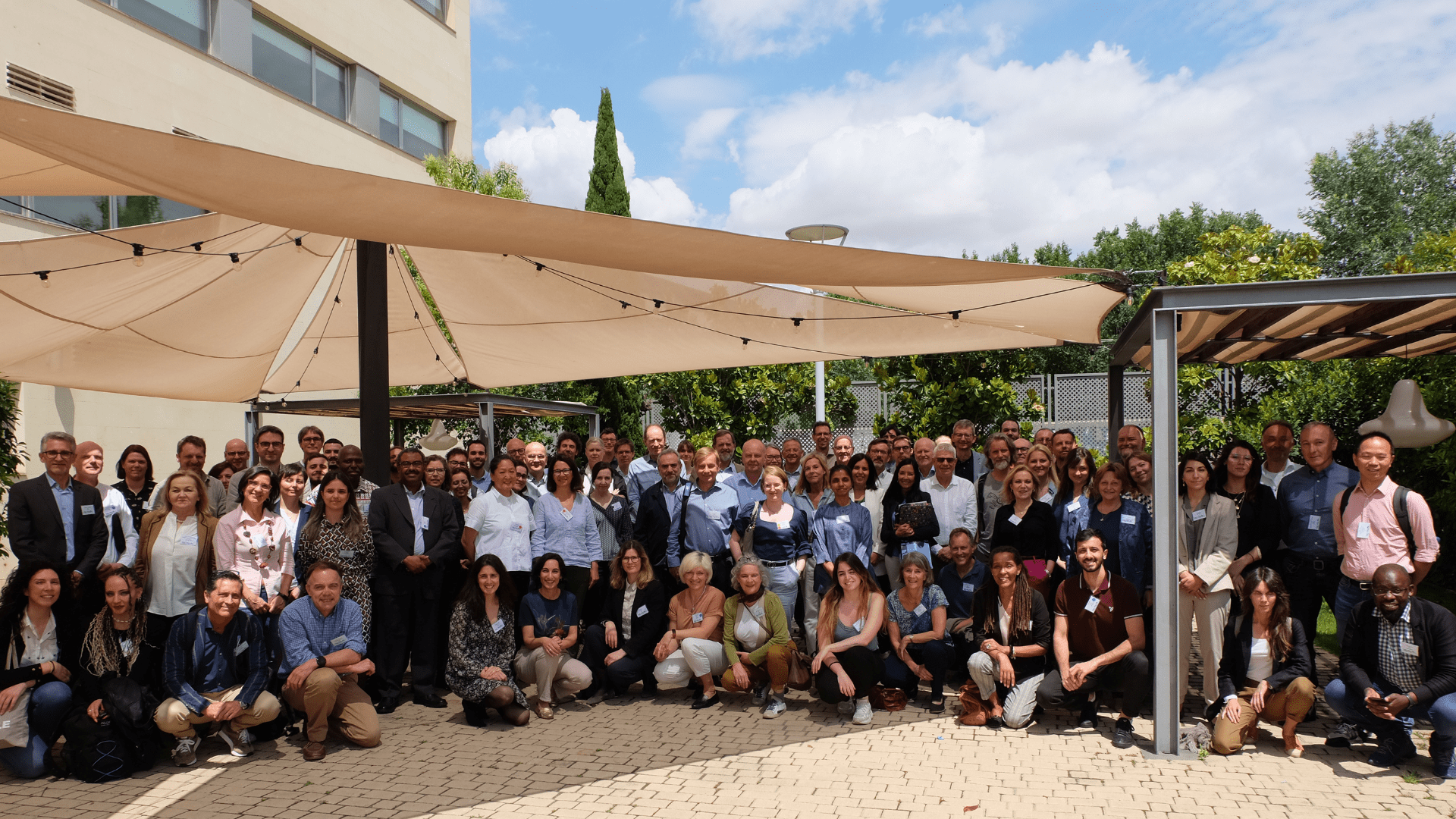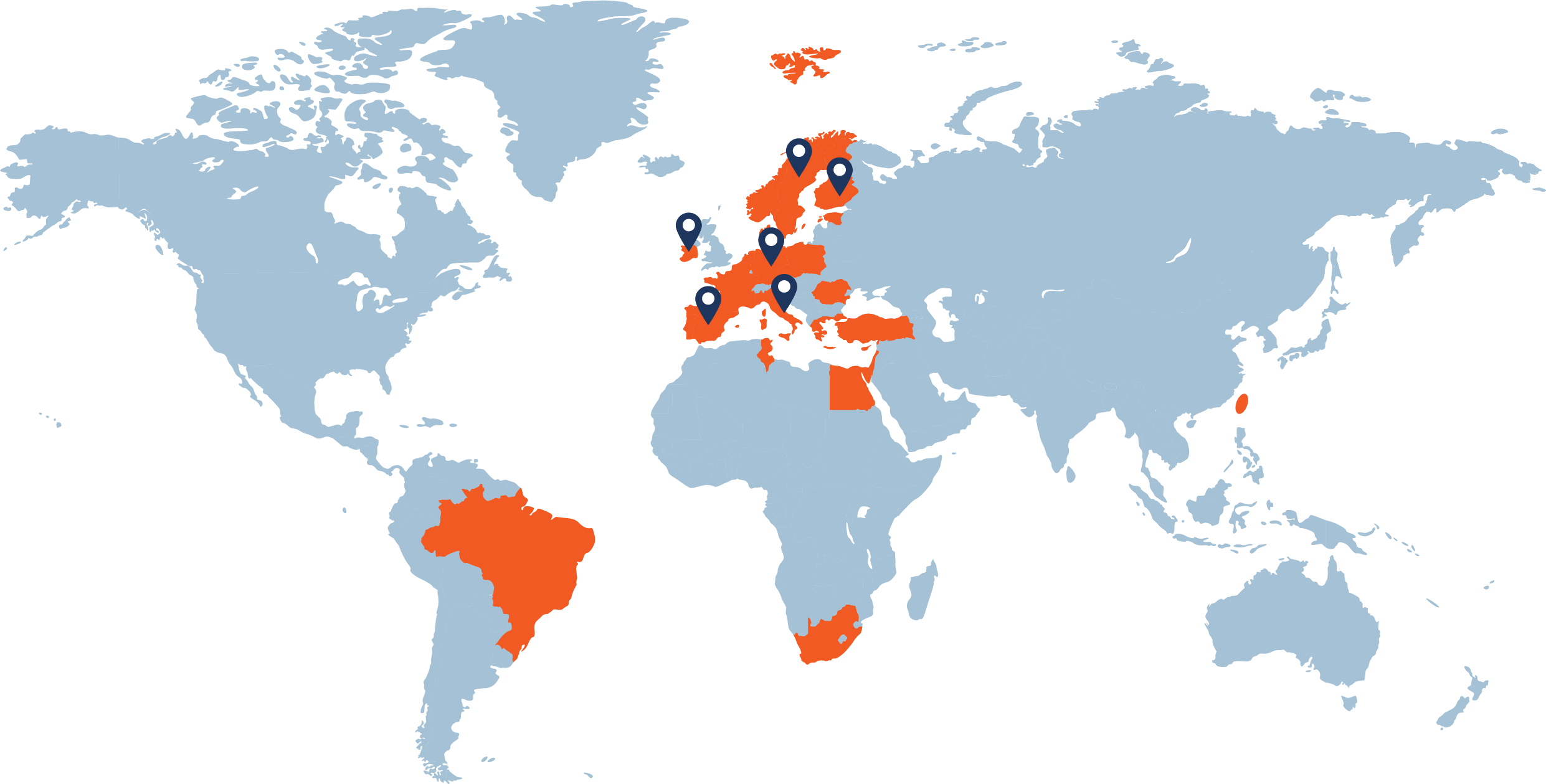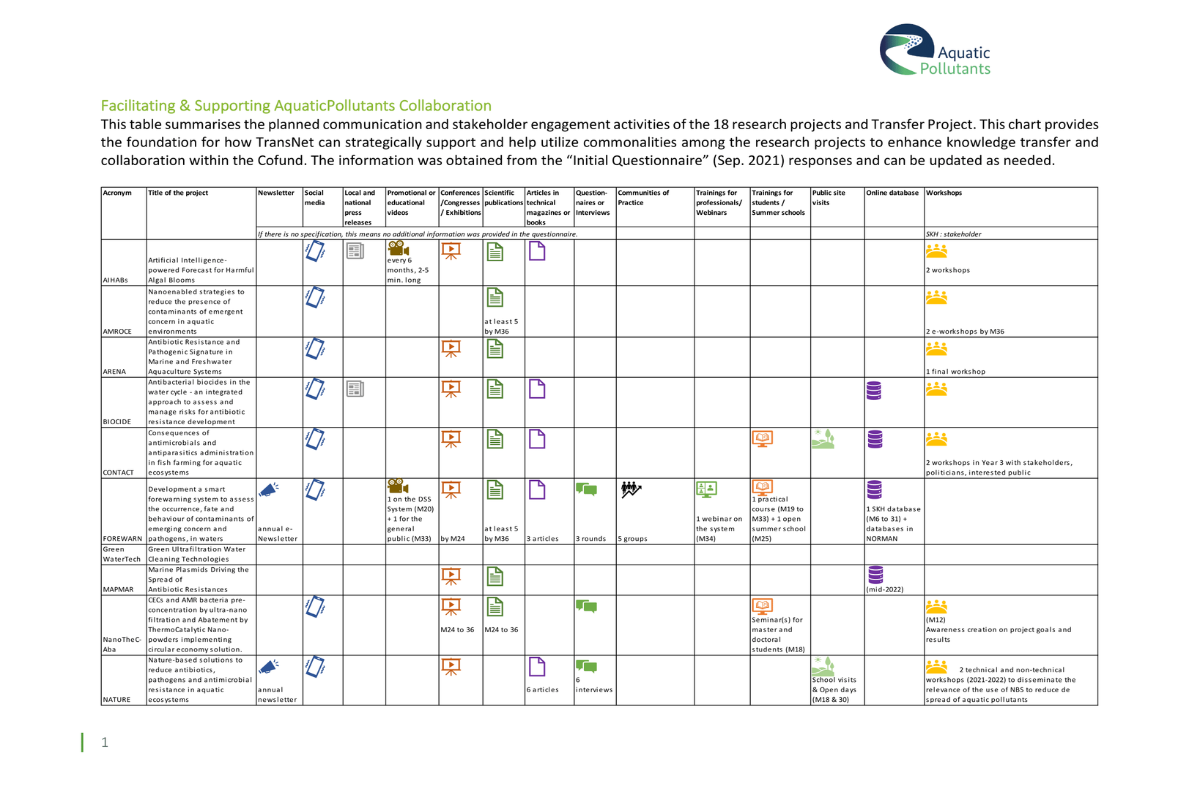After 18 months, the halfway point for the research & innovation projects, the ERA-NET Cofund AquaticPollutants met in person for the first time in Madrid for the AquaticPollutants Midterm Meeting! Representatives from all 18 projects, members of the transfer project, AquaticPollutantsTransNet, and representatives from the funding organisations were all there! Check out the upcoming press release at the AquaticPollutants website to learn more and scroll through this webpage for impressions from the midterm meeting.

Click on the following video link to learn more about how funded projects contribute to a healthy aquatic environment.
What do the communication plans of each of the 18 AquaticPollutants projects look like? In order to download the "Overview of communication and dissemination activities" table below, please click on the image below.
One objective of the Transfer Project is to strategically support the projects and help utilize commonalities among their communication plans to enhance collaboration and knowledge transfer to external stakeholders. Check the AquaticPollutants website and the individual project websites for updates and upcoming activities.
The following map shows the partner countries involved in the ERA-NET Cofund.

![]() Country of Research Projects Coordinators
Country of Research Projects Coordinators
Each of the funded project addresses one of the following three themes of the Joint Transnational Call:
Theme 1 – Measuring
Environmental behaviour of contaminants of emerging concern, pathogens and antimicrobial resistant bacteria in aquatic ecosystems
Theme 2 – Evaluating
Risk Assessment and Management of contaminants of emerging concern, pathogens and antimicrobial resistant bacteria from aquatic ecosystems to human health and environment
Theme 3 – Taking Actions
Strategies to reduce contaminants of emerging concern, pathogens and antimicrobial resistant bacteria in aquatic ecosystems.
The following table shows an overview of the 18 funded research projects of the ERA-NET Cofund AquaticPollutants and respective themes:
Theme 1 - Measuring | Theme 2 - Evaluating | Theme 3 - Taking Actions |
|---|---|---|
| PAIRWISE | BIOCIDE | NanoTheC-Aba |
| SPARE-SEA | PHARMASEA | SERPIC |
| MAPMAR | AIHABs | NATURE |
| ARENA | CONTACT | AMROCE |
| FOREWARN | GreenWaterTech | |
| SARA | PRESAGE | |
| PARRTAE | REWA |
The Transfer Project AquaticPollutants TransNet aims to maximise the transfer of knowledge and impact of the research results and has been funded through the 2020 Transfer Project Call.
At the Midterm Meeting, the young researchers and PhD students also had a chance to talk about the work they’ve done over the past 18 months. These researchers, or “early career scientists” as we like to call them, were invited to present a scientific poster during the 1-hour long poster session on Wednesday, May 31st. Via a QR code, participants could vote for the best poster over the span of the two days. At the very end of the meeting, Naomi Massaccesi from the Italian National Research Council (CNR) was awarded the best poster prize for her work done within the ARENA project.
The poster session was organized by the AquaticPollutants PhD Forum, led by the Israeli Ministry of Health as part of the ERA-NET Cofund. When ask about the importance of the PhD Forum, Ms. Orly Spivak from the Ministry said “It is a top priority to support and advance the young scientists of today, to become the senior scientists of the future, to advance science and innovation”. See what else she had to say during our interview with her in Madrid:
How is the AquaticPollutants PhD Forum structured? What does it offer young researchers?
The PhD forum is a platform to support scientists at their early stages of their careers. By creating a special network for them, which brings together activities for them, such as a LinkedIn page, webinars, contests, we aim to give added value for them to encourage them to stay on the right track for them.
How do you choose and identify topics and speakers for the webinars?
It is not very easy to find speakers for the webinars, however, usually I would contact well-known experts of the aquatic research field and ask them to contribute to our forum. Some of the lecturers contacted us themselves and offered to give a lecture, following an invitation we published to our research community through emailing lists.
How does the PhD Forum support the AquaticPollutants Cofund and its objectives?
It is one of the tasks under the additional activities of the ERA-NET Cofund, which received a designated budget for its activities.
If you’re interested in getting involved, visit their LinkedIn page: aquatic-pollutants-phd-forum/
Naomi Massaccesi
Orly Spivak
Use the cursor to flip the cards and learn more about the 18 funded research projects.
Environmental Spread and Persistence of Antibiotic Resistances in aquatic Systems Exposed to oyster Aquaculture
Project Coordinator: Dr. K. Mathias Wegner,
Alfred Wegener Institute – Helmholtz centre for Polar and Marine Research, Germany
Marine Plasmids Driving the Spread of Antibiotic Resistances
Project Coordinator: Prof. Fernando de la Cruz,
University of Cantabria – Institute for Biomedicine and Biotechnology, Spain
Antibiotic Resistance and Pathogenic Signature in Marine and Freshwater Aquaculture Systems
Project Coordinator: Prof. Fernando de la Cruz,
University of Cantabria – Institute for Biomedicine and Biotechnology, Spain
Dispersal of antibiotic resistance and antibiotics in water ecosystems and influence on livestock and aquatic wildlife
Project Coordinator: Karin Persson Walker & Oskar Nilsson
National Veterinary Insitute (SVA), Department of Animal Health and Antimicrobial Strategies, Sweden
Surveillance of Emerging Pathogens and Antibiotic Resistances in Aquatic Ecosystems
Project Coordinator: Dr. Andreas Tiehm,
DVGW-Technologiezentrum Wasser (TZW), Germany
Probing Antibiotic Residues and Resistance transfer in Aquatic Environments
Project Coordinator: Dr. Åsa Sjöling,
Karolinska Institute, Sweden
Development a smart forewarning system to assess the occurrence, fate and behaviour of contaminants of emerging concern and pathogens, in waters
Project Coordinator: Dr. Esteban Abad & Marinella Farré,
Institute of Environmental Assessment and Water Research (IDAEA) – Spanish National Research Council (CSIC), Spain
Artificial Intelligence-powered Forecast for Harmful Algal Blooms
Project Coordinator: Dr. Ahmed Nasr,
Technological University Dublin (TU Dublin), Ireland
Consequences of antimicrobials and antiparasitics administration in fish farming for aquatic ecosystems
Project Coordinator: Prof. Dr. Michael Schloter,
Helmholtz Zentrum Muenchen - German Research Center for Environmental Health (GmbH); Research Unit Comparative Microbiome Analysis, Germany
Presence, behavior and risk assessment of pharmaceuticals in marine ecosystems
Project Coordinator: Prof. Francesco Regoli,
Polytechnic University of Marche, Department of Life and Environmental Sciences (DiSVA), Italy
Antibacterial biocides in the water cycle – an integrated approach to assess and manage risks for antibiotic resistance development
Project Coordinator: Prof. Joakim Larsson,
Centre for Antibiotic Resistance Research (CARe) at University of Gothenburg, Sweden
Green Ultrafiltration Water Cleaning Technologies
Project Coordinator: Prof. Lars Österlund,
Uppsala University, Sweden
CECs and AMR bacteria pre-concentration by ultra-nano filtration and Abatement by ThermoCatalytic Nanopowders implementing circular economy solution
Project Coordinator: Giuliana Magnacca,
Torino University, Italy
Nanoenabled strategies to reduce the presence of contaminants of emergent concern in aquatic environments
Project Coordinator: Prof. Tzanko Tzanov,
Universitat Politècnica de Catalunya, Spain
Sustainable Electrochemical Reduction of contaminants of emerging concern and Pathogens in WWTP effluent for Irrigation of Crops
Project Coordinator: Dr. Lothar Schäfer,
Fraunhofer-Gesellschaft zur Förderung der angewandten Forschung e.V., Germany
Potential of decentralized wastewater treatment for preventing the spread of antibiotic resistance, organic micropollutants, pathogens and viruses
Project Coordinator: Prof. Francisco Omil,
University of Santiago de Compostela, Spain
Nature-Based Solutions to Reduce Antibiotics, Pathogens and Antimicrobial Resistance in Aquatic Ecosystems
Project Coordinator: Dr. Víctor Matamoros,
Institute of Environmental Assessment and Water Studies (IDAEA) – Spanish National Research Council (CSIC), Spain
Reduction and assessment of antimicrobial resistance and emerging pollutants in natural-based water treatment systems
Project Coordinator: Dr. Tiina Leiviskä,
University of Oulu, Finland
